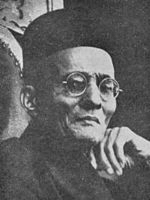How to Pronounce Vinayak Damodar Savarkar
#50
Most Popular
Boost
May 28, 1883 Bhagur, Maharashtra, India Died on 26 Feb 1966 (aged 82)
Indian pro-independence activist,lawyer, politician, poet, writer, playwriter and publisher.
Gemini
